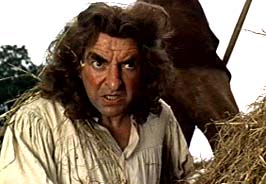In the Mouth of Madness begins with John Trent (Sam Neill) being taken to an asylum, where an inquisitive doctor (David Warner) asks to hear his tale. This doctor also comments on how clever Trent is to cover himself and his cell in black crayon crosses; it's almost like he wants to stay in the psych ward.
 |
| He doesn't look crazy at all, does he? |
Things only get more surreal when Trent has an epiphany; through a laughably convoluted scenario, Trent comes to the conclusion that Sutter Cane is hiding in a hidden town that is named after the fictional setting for his stories. Oddly enough, Trent appears to be right; but is the town based on the fiction, or are the books based on the town?
The acting in In the Mouth of Madness is a little odd. I like Sam Neill just fine, although I occasionally questioned his accent. The rest of the cast, though...I'm less sure of. Julie Carmen doesn't seem to match the script very well, playing a pretty boring character, even when things take a turn to the fantastic. Jürgen Prochnow does his best to play up to the maniacal gatekeeper his character is written as, but it's a surprisingly non-sinister role that could have used more depth. Also, his hair was distracting.
 |
| Evil is sometimes fluffy |
 |
| The obvious successor to Jake Lloyd |
This is the third and final chapter in what John Carpenter refers to as his Apocalypse Trilogy; as far as I can tell, they are unrelated except for the depressing endings (the other two are The Thing and Prince of Darkness). The more I see of Carpenter's work, the more I appreciate him. That's not to say that the man doesn't disappoint from time to time, but he is consistent in his own way. For instance, In the Mouth of Madness is yet another plot-driven film with a largely unimpressive cast and some solid special effects. One of the downsides to this film is that Carpenter chooses to only give glimpses of the underlying horror in the movie, instead of glorifying in it, like he does in The Thing.
 |
| Take a good look, because this is all you get |
My problem with In the Mouth of Madness is with the story. For starters, I don't particularly enjoy metafiction; I think it is usually used by less talented writers to disguise the depth of bad scripts. This movie didn't change my opinion. The fact that it is mentioned early and often that Sutter Cane's fans frequently believe that his fictional world is reality makes it a foregone conclusion that In the Mouth of Madness will eventually get to the question of "What is reality?" That's a respectable theme, but John Carpenter isn't the director for it, and this isn't the script to explore it with. There isn't a twist. You see the basic developments miles away, and that negates the alleged cleverness of the concept.
There are some good little moments here and there --- the makeup is good (when glimpsed) and I thought the insane asylum Carpenters (the band) joke was hilarious --- but there's just so much clumsiness. For instance, Trent concludes that Sutter Cane is in New Hampshire by noticing a common red line on all of Cane's paperback covers; if you arrange the red lines just right, they make the outline of New Hampshire. First of all, what makes someone look at a tiny snippet of a line and think, "Hey, that looks Hampshirian!" Second, how many other shapes could have been made, using the images on those book covers? Honestly, I don't care to know the answer. This isn't an awful film, but it sets the bar high and doesn't come close to meeting it. I'll give it credit for ambition, but the execution simply isn't there.
While researching this film, I stumbled across a blog that featured art for Criterion Collection DVD covers for movies that haven't been selected for the Criterion Collection yet. Does In the Mouth of Madness deserve the Crtierion treatment? Definitely not. Still, this is a pretty cool cover.

















